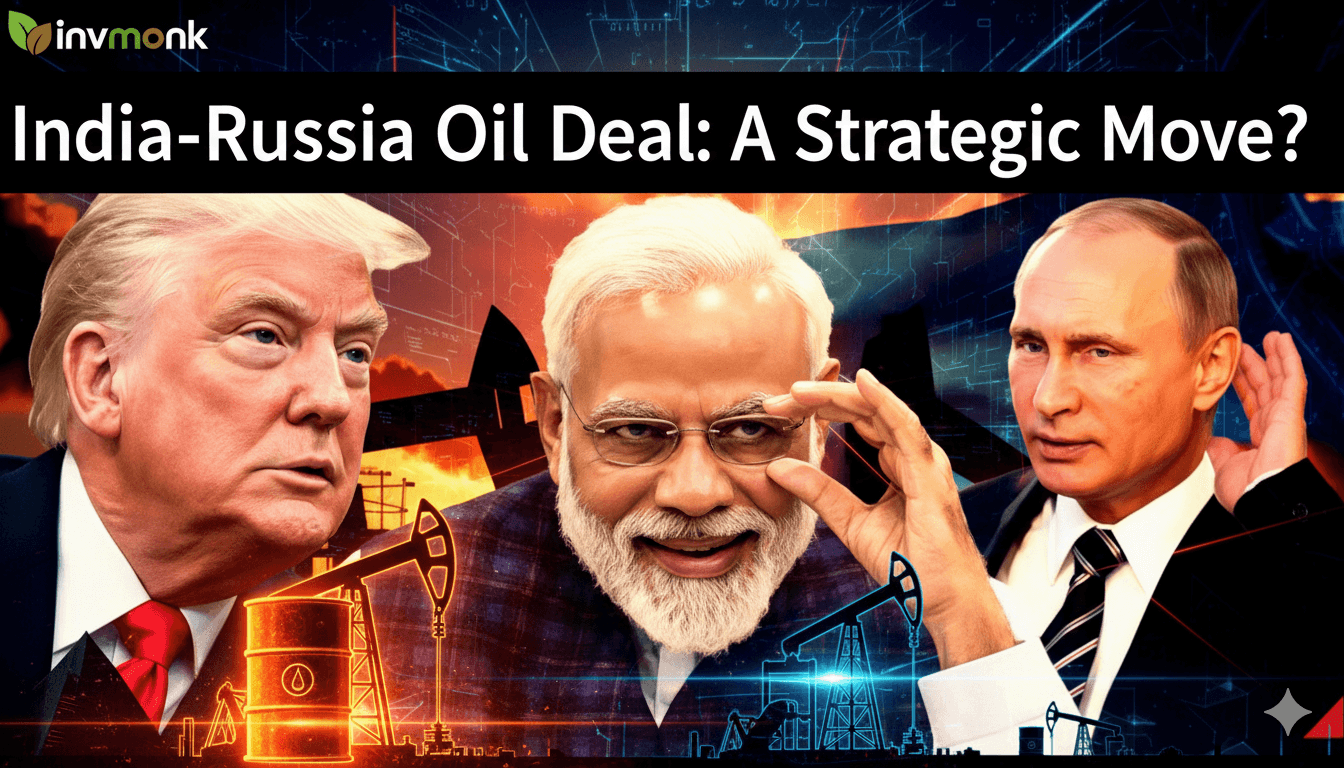In a fast-developing diplomatic spat, India has firmly refuted U.S. President Donald Trump’s claim that Prime Minister Narendra Modi assured him India would cease buying Russian oil. The Ministry of External Affairs (MEA) has clarified that there was no telephonic conversation between the two leaders on the day in question, and reiterated that India’s energy import policy is driven strictly by consumer interests and national priorities.
Trump’s Assertion: Modi Promised to Stop Russian Oil Imports
During a White House press event, President Trump asserted that he had a call with PM Modi in which the Indian leader pledged that “they will not be buying oil from Russia.” He characterized this as a “big step” and said it would support U.S. efforts to isolate Russia over its war in Ukraine. According to Trump, Modi told him the transition would take time: “you can’t do it immediately … it’s a little bit of a process, but the process is going to be over with soon.”
He also tied this to wider geopolitical goals: “If India does not buy oil, it makes ending the Russia-Ukraine war easier,” he said, adding that he aims to pressure China similarly.
Trump further claimed he had raised concerns with Modi about India’s continued purchase of Russian crude, which, he argued, indirectly funnels money to Moscow’s war efforts.
India’s Response: “No Phone Call Yesterday”
In response, MEA spokesperson Randhir Jaiswal made a categorical statement during his weekly briefing:
“As per my information, there was no telephonic conversation between PM Modi and US President Trump yesterday.”
He clarified that any claim of a conversation would be inaccurate.
The MEA reiterated its long-standing posture on energy imports:
- India is a major importer of oil and gas, and its policies must protect the domestic consumer, especially in volatile markets.
- The twin goals of affordable energy and secure supply remain central to India’s energy strategy.
- India pursues diversified sourcing, adjusting to global market conditions as needed.
In short, the government emphasized strategic autonomy: New Delhi will not allow external pressure to dictate its energy policy.
Why India Stands Its Ground
There are several key considerations behind India’s firm stance:
- Consumer Welfare & Economic Stability
India’s energy needs are vast. Any abrupt cut to a major supplier like Russia could set off price shocks, inflationary pressure, and supply instability. The government underscores that policies must protect citizens first. - Discounted Russian Oil & Market Realities
Since the Ukraine war began, India has leveraged discounted Russian crude, as Western sanctions have constrained other buyers. That has made Russian supplies economically attractive. Some Indian refiners depend on that discount to remain competitive. (For example, one Indian refinery reportedly sourced 35–40% of its crude from Russia in recent quarters.) Reuters - Diplomatic and Trade Backdrop
The exchange comes amid escalating tensions between India and the U.S. over tariffs. Earlier this year, Trump’s administration levied sweeping 25% tariffs on Indian goods and later threatened further penalties tied to Russian oil imports—bringing trade relations into sharp focus. Wikipedia+1 Trump’s remarks may be part of broader pressure tactics as trade talks continue. India’s refusal to concede on this front may stem from the determination to preserve bargaining leverage. - Avoiding Perception of Capitulation
Accepting Trump’s claim without denial could imply that India’s policy is subject to U.S. diktat, undermining Delhi’s image of sovereign, independent decision-making. The MEA’s prompt and blunt denial underscores that India intends to project strength, not acquiescence. - Russian Diplomacy Weighs In
Moscow has responded cautiously. Kremlin spokesman Dmitry Peskov stated that Russia would abide by the official statements from countries like India and China regarding oil trade, suggesting no direct rebuttal of Trump’s claims but also deferring to India’s government. Newsweek Meanwhile, Russia’s ambassador in India, Denis Alipov, affirmed that India’s energy decisions should remain tied to national interest, and asserted that Russian supplies remain beneficial to the Indian economy. The Times of India
The Broader Stakes: Energy, Diplomacy & Global Pressure
The row over energy imports is not merely about crude—it touches several broader strategic dimensions:
- Global Pressure on Russia: The U.S. has long sought to isolate Moscow financially by cutting its energy market. India’s continued import of Russian oil is viewed by Washington as undermining that pressure.
- Geopolitical Balancing: India has attempted a calibrated diplomatic path—maintaining ties with both the U.S. and Russia despite tensions. This episode tests that balancing act.
- Trade Leverage: In the current trade standoff, energy is one of the tools Washington wields—and India’s refusal to accept external diktums preserves its negotiating strength.
- Message to Other Countries: If India—one of the world’s largest energy consumers—bows to pressure, smaller states might follow. India’s defiance may inspire others to resist similar coercion.
What Happens Next?
- Clarifications & Rebuttals: Expect further statements from both sides. The U.S. might produce evidence of the claimed conversation, while India will likely maintain its narrative of no call.
- Refinery & Procurement Adjustments: Indian refiners may begin planning gradual rebalancing of crude sources to lower dependence on Russia, in response to external pressure—but only where economically viable. Reuters
- Trade Negotiations: This oil narrative feeds directly into the larger U.S.–India trade negotiations. How India navigates this crisis may have ripple effects on deals under discussion.
- Global Diplomacy: Other nations will watch closely. The episode could become a reference point in how countries resist or yield to geopolitical pressure over energy decisions.
Conclusion: Sovereignty, Strategy, and Signals
At its core, the clash over Trump’s claim and India’s swift denial underscores a deeper tension between great‐power pressure and national sovereignty. India wants to affirm that its policies—especially those tied to something as fundamental as energy—cannot be dictated by external actors, no matter how powerful.
Trump’s allegation may have been an attempt to influence India’s foreign policy publicly. India’s instantaneous denial and the emphasis on consumer welfare signal that New Delhi is willing to push back—even against a U.S. president—to defend its autonomy.
In the high-stakes diplomacy of energy, every word matters. India’s response sends a clear message: promises, if any, are not made under U.S. influence. And as global energy geopolitics recalibrate, India intends to chart its own course.

